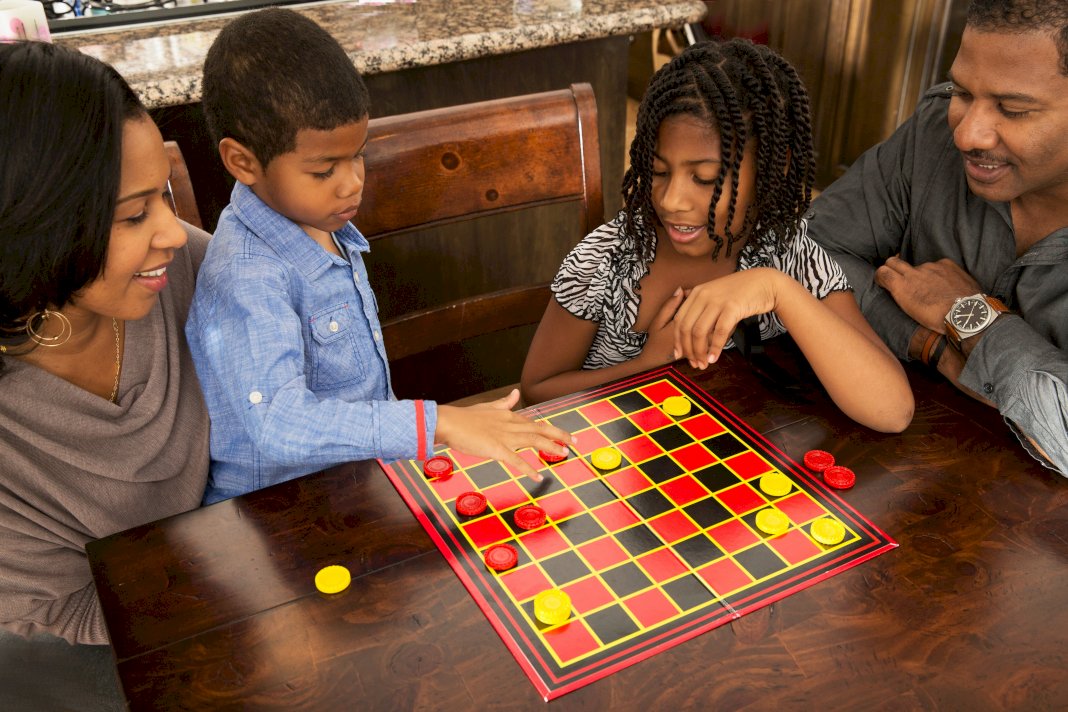Regular family game nights can bring many benefits, spanning from improved cognitive skills to strengthened family bonds. Games, especially strategy ones, stimulate cognitive functions, enhancing memory, concentration, and problem-solving abilities. They also foster a sense of teamwork, improving communication skills and cooperation among family members.
According to the New York Times, families that engage in games together at least once a week report stronger relationships and increased satisfaction within the family unit. Additionally, a survey conducted by Hasbro revealed that 91% of those polled believed that regular family game nights helped them to feel closer to their family members.
If there is any game that is easy to set up, it is board games. Often coming in a portable box, board games are a classic form of family fun that can provide hours of entertainment. You can find different types of board games to suit any age range and skill level. Here are a few board games to consider:
Monopoly

Monopoly is a classic board game that has been around since 1933. It allows up to 8 players to buy, sell, and trade properties, complete with houses and hotels. This game is excellent for older kids as it requires more excellent mathematical skills and strategic thinking. Here are a few things you can pick up when playing Monopoly:
A Lesson in Economics
Monopoly is a classic board game that helps children and adults grasp basic economics and money management principles. Players buy, rent, and sell properties, learning about investments, mortgages, and bankruptcy in a fun, hands-on manner.
Strategic Thinking
Monopoly isn’t simply a game of chance. It requires strategic thinking and planning, enhancing critical thinking skills. Players must decide when to buy properties when to invest in houses or hotels, or when to trade properties with others.
Social Skills
Monopoly also promotes social interaction and communication. Players negotiate trades and alliances, honing their negotiation skills and learning about human behavior and competition. Families come together, laughing, debating, and bonding, which can enhance family relationships.
Patience and Persistence
Finally, Monopoly teaches patience and persistence. Given its potentially long duration, players must stay focused and patient, waiting for the right opportunities to maximize their investments. Perseverance is rewarded as the game often swings in unexpected directions, reinforcing the value of sticking with a strategy.
Codenames
Codenames is a stimulating board game, perfect for those who enjoy a mental challenge. The game encourages strategic thinking, communication, and teamwork, making it a fantastic choice for family game night. Here are a few reasons why the Codenames board game is a must-try game:
Cognitive Challenge
Codenames are a game of guessing, strategy, and clever word association. It involves two teams, each with a “spymaster” who knows the secret identities of 25 agents. The spymasters take turns giving one-word clues that can point to multiple words on the board, and their team members must guess the agents’ codenames while avoiding those that belong to the opposing team. This mental workout can help improve memory, critical thinking, and problem-solving skills.
Teamwork and Communication
Communication and collaboration are key in Codenames. Teams must work together to decipher the spymaster’s clues, promoting cooperation and teamwork. It encourages open and effective communication, as players must discuss and debate their thoughts on each clue.
Educational Value
Codenames are also an excellent educational tool. It helps build vocabulary and can be a fun way to learn new words. Additionally, as the game involves quick decision-making based on limited information, it can help children understand risk assessment and strategic planning.
Easy to Learn and Play
One of the great things about Codenames is its simplicity. The game rules are straightforward, making it easy for players of all ages to pick up. You’re ready to go once you’ve set up the 5×5 grid of codenames and the key card that reveals the agents’ locations to the spymasters. The game continues until one team identifies all their agents correctly or when an agent of the assassin is pointed out. With its quick setup and easy-to-understand rules, Codenames is ideal for a fun, engaging, and brain-stimulating game night.
Scrabble

Everyone’s favorite word game, Scrabble, is the perfect way to unite people of all ages. It requires strategy and a good vocabulary – children can learn new words while playing! Here are a few other benefits that come with this classic board game:
Word Games Improve Vocabulary
Scrabble helps players expand their vocabulary and become more familiar with new words. Players must be creative and think of different ways to use letters to form words, helping them learn the definition and spelling of each one.
Cognitive Stimulation
Scrabble is a great way to engage players in strategic thinking and problem-solving. Players must choose the best words while using geometry and mathematics to calculate scores for each word. This game also helps develop memory and concentration, as players need to remember words they can use for later turns.
Enhancing Communication Skills
Scrabble is a social game that encourages face-to-face communication. Players must discuss strategies with their opponents, enhancing verbal communication skills. It also helps children learn about sportsmanship and interact with others in a competitive environment.
Final Thoughts
Board games can provide hours of entertainment and relaxation for the whole family. With a wide range of board games, there’s something for everyone – from classic Monopoly and Scrabble to modern Codenames and Quirkle. Not only are board games fun, but they also offer various cognitive, social, and educational benefits. So why not gather your family and settle for a night of board game fun? It will be sure to bring you all closer together.
For more valuable information visit our website.





